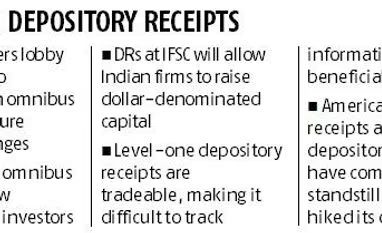Govt may allow exchanges from the IFSC to issue depository receipts
Market players have lobbied the government to allow DRs with an omnibus account structure to be listed and traded on IFSC exchanges
)
Explore Business Standard
Market players have lobbied the government to allow DRs with an omnibus account structure to be listed and traded on IFSC exchanges
)
Already subscribed? Log in
Subscribe to read the full story →

3 Months
₹300/Month
1 Year
₹225/Month
2 Years
₹162/Month
Renews automatically, cancel anytime

Over 30 premium stories daily, handpicked by our editors



News, Games, Cooking, Audio, Wirecutter & The Athletic

Digital replica of our daily newspaper — with options to read, save, and share



Insights on markets, finance, politics, tech, and more delivered to your inbox

In-depth market analysis & insights with access to The Smart Investor



Repository of articles and publications dating back to 1997

Uninterrupted reading experience with no advertisements



Access Business Standard across devices — mobile, tablet, or PC, via web or app
First Published: Jan 04 2019 | 10:17 PM IST